Our live coverage is movingpublished at 23:50 GMT 23 March 2022
For technical reasons we're moving our live coverage to a new webpage.
Please follow us here for all the latest from the Ukraine war.
Nato leaders will approve major increases in its forces in eastern Europe at an emergency summit, Nato's secretary general says
Jens Stoltenberg says four new battlegroups will be sent to Slovakia, Hungary, Bulgaria and Romania
US President Joe Biden is travelling to Brussels for the Nato summit on Thursday
The US says that members of Russia's forces have committed war crimes in Ukraine
There are reports of the Ukrainian flag being raised again in the suburb of Makariv, west of the capital Kyiv
But Russian bombardment of the southern port city of Mariupol continues unabated, with some 100,000 people said to be trapped there
Edited by Jude Sheerin
For technical reasons we're moving our live coverage to a new webpage.
Please follow us here for all the latest from the Ukraine war.
British Prime Minister Boris Johnson is set to announce on Thursday that the UK will provide Ukraine with about 6,000 extra missiles.
At the Nato and G7 leaders' meetings in Brussels, Johnson will also unveil £25m ($33m) of funding to help pay Ukrainian soldiers and pilots.
The UK government will also provide £4.1m for the BBC World Service to help support its Ukrainian and Russian language services in the region.
"The United Kingdom will work with our allies to step up military and economic support to Ukraine, strengthening their defences as they turn the tide in this fight," Johnson said.
"One month into this crisis, the international community faces a choice. We can keep the flame of freedom alive in Ukraine, or risk it being snuffed out across Europe and the world."
Britain said the new package will come on top of around 4,000 missiles already provided by the UK to Ukrainian forces.
The latest funding is in addition to £400m already committed in humanitarian and economic aid, said UK officials.
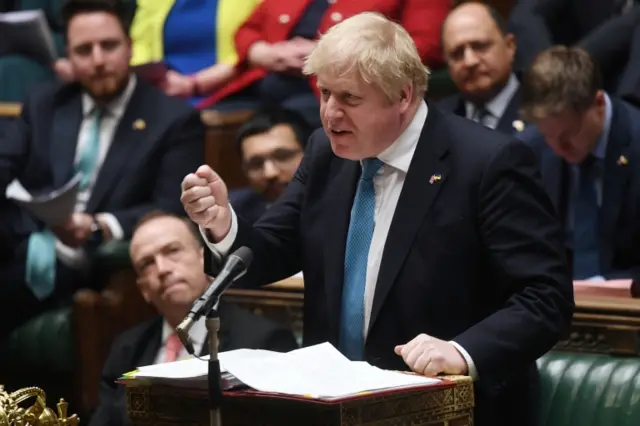 Image source, Reuters
Image source, ReutersBoris Johnson vowed "to keep the flame of freedom alive in Ukraine"
 Nada Tawfik
Nada Tawfik
BBC News, New York
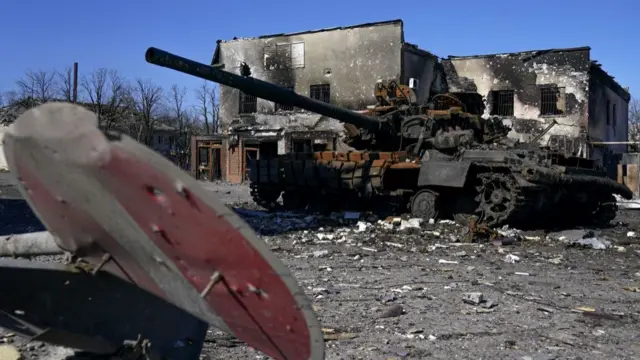 Image source, Getty Images
Image source, Getty ImagesIt’s getting harder and harder for Russia to deny its isolation on the international stage.
Besides its ally, China, all 13 members abstained from voting on Moscow’s draft.
The common message from most members was if Russia cared, and wanted to relieve the suffering of the Ukrainian people, it could end its war now.
Instead, Russia’s draft does not even recognise it is the sole cause of the humanitarian disaster or respond to the realities on the ground.
Ukraine has its own humanitarian resolution set for a vote in the General Assembly, where Russia cannot wield its veto.
Still, Moscow doesn’t show any sign of changing course.
It denounced the latest General Assembly vote as another anti-Russian show and blamed the humanitarian devastation on Ukrainian "nationalists and radicals".
As British diplomat Barbara Woodward told me after the vote: "I think Russia has consistently misplayed its hand here, and seriously underestimated the consequences of what it's done and the international perception of what it's done.
"They tabled this resolution over a week ago and they kept it on the table and rolled it forward. And, we saw the result today. Only one country supported Russia."
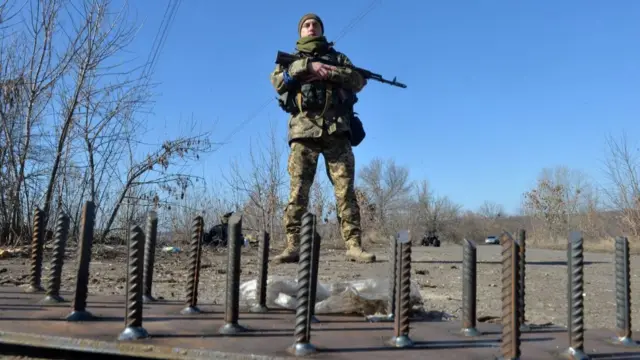 Image source, Getty Images
Image source, Getty ImagesUkraine's forces are "increasing pressure" on Russian troops occupying the region north-east of Kyiv, according to the latest intelligence assessment from the UK Ministry of Defence.
Ukraine is continuing to carry out "successful counter attacks" on Russians outside the capital, the report says, and the Ukrainians have probably retaken the towns of Makariv and Moschun.
"There is a realistic possibility that Ukrainian forces are now able to encircle Russian units in Bucha and Irpin," assesses the MoD.
British military officials note that Russian troops along the axis north-east of Kyiv are facing "considerable supply and morale issues".
"It is likely that successful counter attacks by Ukraine will disrupt the ability of Russian forces to reorganise and resume their offensive towards Kyiv," says the report.

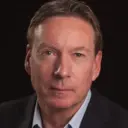 Frank Gardner
Frank Gardner
BBC Security Correspondent
Russia’s unprovoked invasion of its Slavic neighbour has triggered Europe’s worst security crisis since the Second World War.
And yet, one month on, Russian forces have failed to exert full control over a single major city, their advance has stalled on several fronts and in some places they have even lost ground to Ukrainian counter-attacks.
Bolstered by hi-tech weaponry from Britain and other Nato countries, Ukrainians have proven themselves both brave and resilient. But their defiance has come at a terrible cost.
The southern port of Mariupol will go down in history as one of the most bombed and shattered cities of our time. Its destruction has been labelled a war crime.
And Ukraine still faces major challenges. Its forces are running low on weapons and ammunition, armed Russian drones are now operating largely with impunity and Moscow is calling up reinforcements.
President Putin appears set on subjugating Ukraine even if that means reducing it to a smouldering ruin.
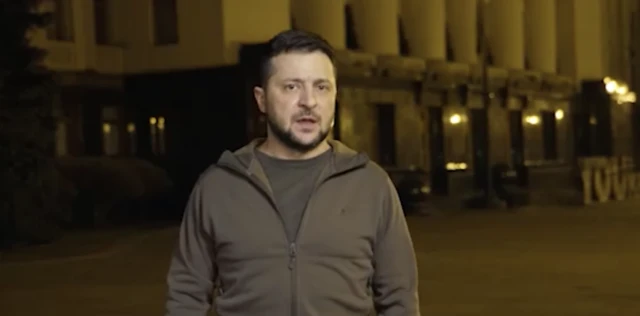 Image source, Ukrainian government
Image source, Ukrainian governmentZelensky spoke in English during his nightly address
Ukrainian President Volodymyr Zelensky, who has been delivering nightly video addresses since the start of the war, has called on people around the world to publicly protest on Thursday - the one month anniversary of Russia's invasion.
"The war of Russia is not only the war against Ukraine. Its meaning is much wider," Zelensky says, for the first time delivering his address in English.
"Russia started the war against freedom," he continues, adding: "This is only the beginning for Russia."
"Russia is trying to defeat the freedom of all people in Europe. Of all the people in the world."
"It tried to show that only crude and cruel force matters," he continues.
He adds: "The world must stop Russia. The world must stop the war."
"One month already. That long. It breaks my heart, the hearts of all Ukrainians and every free person on the planet."
He goes on to call for street demonstrations and for protesters to march while wearing Ukrainian symbols.
"Come to your squares, your streets. Make yourself visible and heard," he says.
"Say that people matter, freedom matters, people matter, peace matters. Ukraine matters."
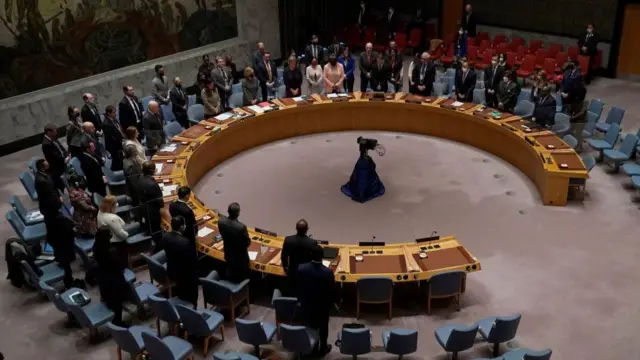 Image source, Getty Images
Image source, Getty ImagesA Russian-drafted resolution has failed to pass the UN Security Council.
The resolution called for aid access in Ukraine, but made no mention of Moscow's role in the war.
Russia and China were the only members to vote yes, while the remaining 13 members abstained.
A rival humanitarian resolution drafted by Ukraine is due to be voted on in the General Assembly in the coming days.
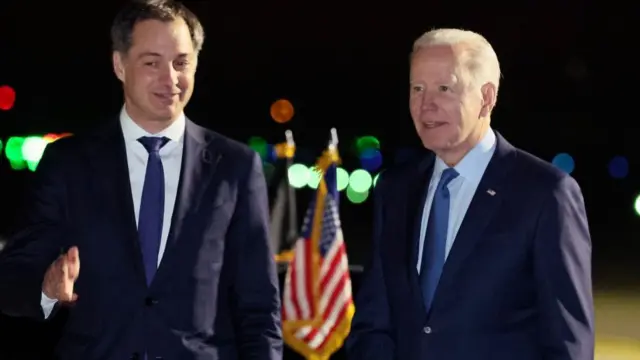 Image source, Getty Images
Image source, Getty ImagesBiden was greeted at the Brussels airport by Belgium's prime minister
If you're just joining us, here's a quick recap of some of the latest developments on day 28 of Russia's invasion of Ukraine:
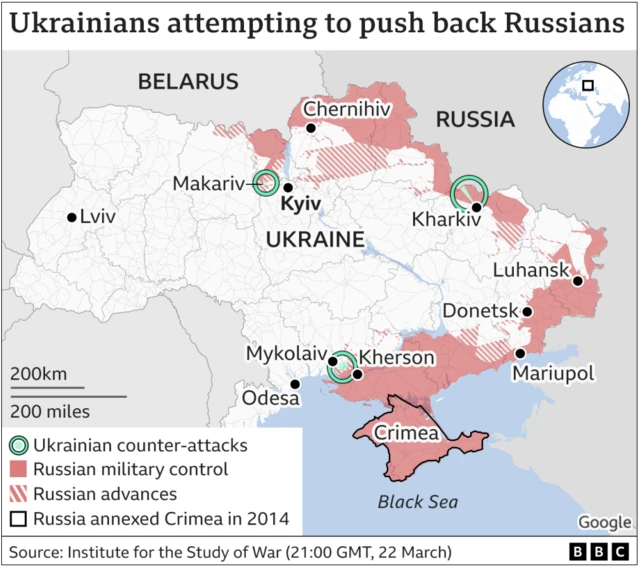
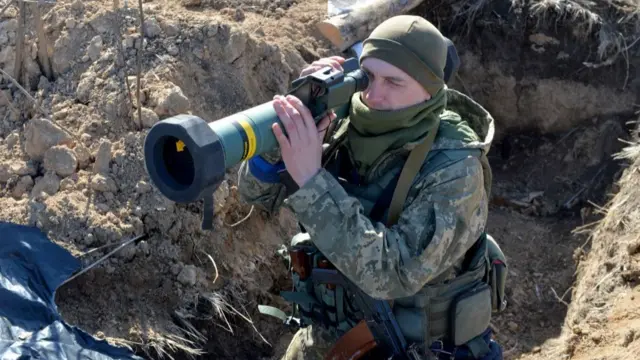 Image source, Getty Images
Image source, Getty ImagesA Ukrainian soldier holds a US-based Javelin missile launcher outside Kharkiv
The first shipments of weapons for Ukraine that were pledged by American lawmakers in a recently passed aid package will be sent to Ukraine in the next day or two, a senior US defence official told Reuters.
The weapons will reach Ukraine quickly after departure, the unnamed official said, also refusing to specify which weapons would be delivered.
The official added that weapons already in use by Ukrainian troops would be prioritised for delivery.
"We are already aggregating stocks in the United States and we're getting ready to ship them over there," the official said.
Read more:
What weapons is the US giving Ukraine - and how much will they help?
 Bethany Bell
Bethany Bell
BBC News, Vienna
The head of the UN’s nuclear watchdog, Rafael Grossi, has again stressed what he called “the urgent need” to send experts and equipment to Ukraine to help ensure the safety and security of its nuclear facilities and prevent the risk of a severe accident.
Grossi said he remained gravely concerned about the situation in Ukraine.
He said he hoped to work out an agreement to provide technical assistance for the safe and secure operation of Ukrainian nuclear sites, but that a positive solution had not yet been reached.
"We cannot afford to lose any more time," he said. "We need to act now."
Ukraine’s atomic facilities include 15 reactors as well as Chernobyl, the site of the world’s worst nuclear accident in 1986.
Ukrainian officials have said that more than 4,500 people were evacuated from Ukrainian cities via humanitarian corridors on Wednesday.
Nearly 3,000 of them travelled from the besieged city of Mariupol to Zaporizhzhia, Ukraine's deputy prime minister said, according to the Kyiv Independent newspaper, external.
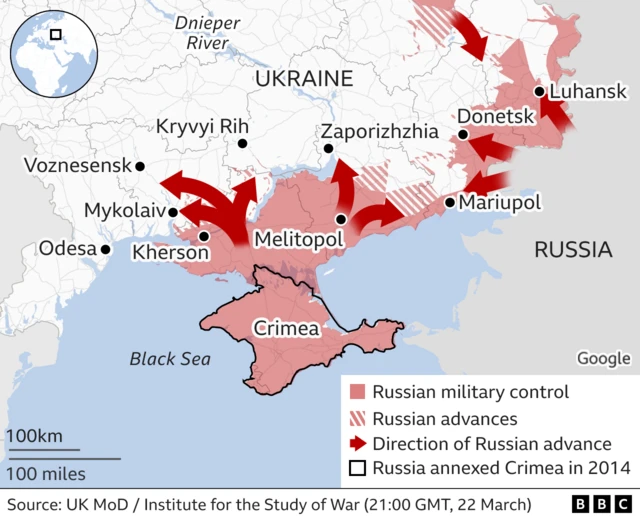 Image source, .
Image source, .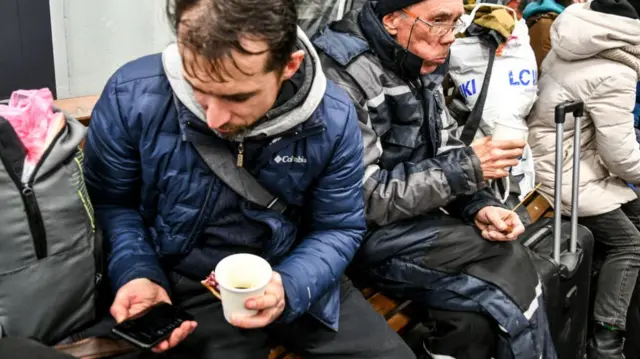 Image source, Getty Images
Image source, Getty ImagesAn evacuee from Berdyansk checks his phone
Russian Deputy Foreign Minister Oleg Syromolotov has denounced US claims that Russia is planning cyber attacks in retaliation for western businesses pulling out of Russia.
"These accusations against us are absurd," he said in a statement.
On Monday, President Biden said that it was the patriotic duty of American companies to shore up their cyber defences against possible Russian attacks.
Mr Syromolotov called the warning a "new outburst of Russophobia against the backdrop of the situation in Ukraine".
Read more:
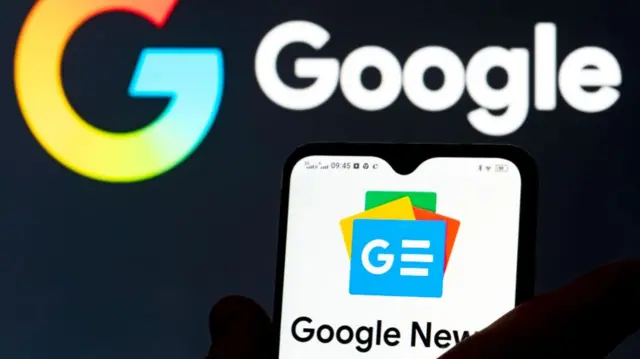 Image source, Getty Images
Image source, Getty ImagesRussia has blocked access to Google News after accusing the news aggregation site of spreading false information about the war.
The decision came at the request of Russia's Prosecutor-General's Office, Interfax news agency reported.
The office determined that the website "provided access to numerous publications and materials containing unreliable socially significant information about the course of a special military operation on the territory of Ukraine," according to the report.
Numerous English language-websites - including Facebook and Instagram - have been blocked in Russia since the invasion of Ukraine. A new law there makes it illegal to report on events that could discredit Russian forces.
Alphabet - the parent company of Google - had said earlier that they would block advert payments to websites and YouTube videos that spread false and harmful information about the war.
In an email to publishers seen by Reuters, Google said it would not run adverts alongside "claims that imply victims are responsible for their own tragedy or similar instances of victim blaming, such as claims that Ukraine is committing genocide or deliberately attacking its own citizens".
French car manufacturer Renault has announced that it is suspending work at its Moscow factory once more.
Earlier today, Ukraine's president called on Renault and other French companies to quit Russia as he addressed the French parliament via videolink.
"They must stop financing the murders of women and children," he told French MPs.
Renault had restarted operations in Moscow this week, after pausing work following the invasion of Ukraine.
In a statement released on Wednesday evening it, external stressed that it was already complying with international sanctions on Russia.
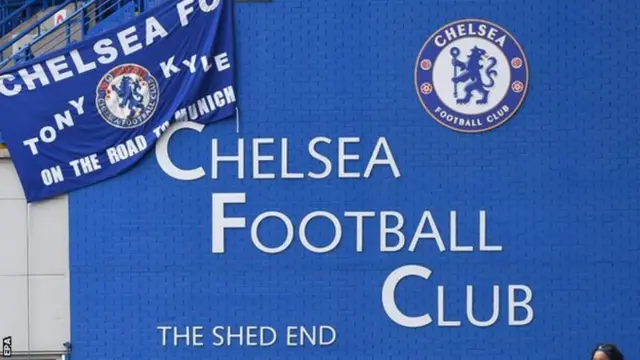 Image source, EPA
Image source, EPAChelsea football club will be allowed to sell tickets to away games, cup matches and games involving the women's team after the UK government made alterations to the club's special licence.
The club have been unable to sell tickets since owner Roman Abramovich was sanctioned by the government as part of its response to Russia's invasion of Ukraine.
Under the changed licence, the club will not receive any revenue from ticket sales. Proceeds will go directly to the Premier League and then be distributed to the relevant party.
Chelsea fans can purchase tickets for future Premier League away games, with any revenue going to the host team.
The move means Chelsea will be able to sell tickets for their home Champions League quarter-final against Real Madrid on 6 April and the FA Cup semi-final against Crystal Palace at Wembley Stadium on the weekend of 16 April.
A Russian journalist reporting from the Ukrainian capital Kyiv has been killed, her publication says.
The Insider says, external Oksana Baulina was filming the destruction after Russian troops shelled the Podolsk district of Kyiv.
Baulina was killed alongside a civilian, and two others were injured, the Insider reports.
Baulina previously worked for Alexei Navalny's Anti-Corruption Foundation and had to leave Russia due to her work with the jailed opposition activist.
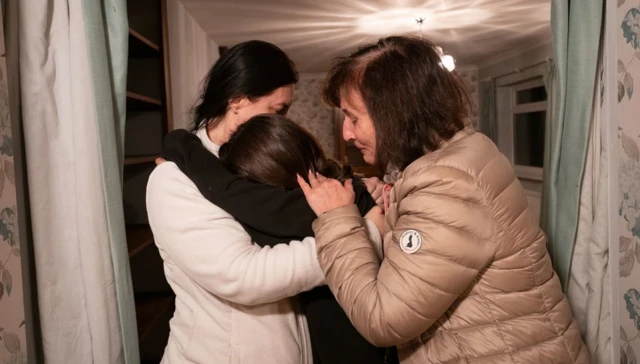 Image source, Joe Giddens/PA Wire
Image source, Joe Giddens/PA WireA four-generation family of 10 have been reunited after fleeing Ukraine and moving to a home in the UK offered by a businessman.
Mick Swinhoe, 52, said he bought the property in a village near Cambourne, Cambridgeshire, as a "project".
He offered it to provide refuge to a Ukrainian family after a social media appeal, saying it was a "better use".
Valeriia, whose family moved in, said it was "such a relief" to arrive in the UK after fleeing the war-torn north-eastern Ukrainian city of Kharkiv.
"Maybe I can feel like I've got a home again," said the 37-year-old.
"I did so much, my family, for us to live there, to earn money, nice place to live, work for kids. We lost in one day everything."
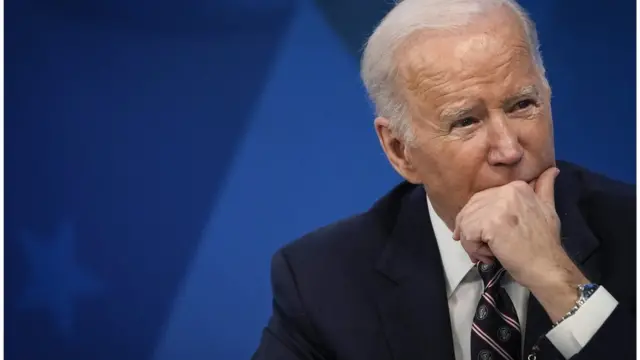 Image source, Getty Images
Image source, Getty ImagesJoe Biden is taking his third trip to Europe as US president at a moment of international crisis.
Speaking on board Air Force One as the president travels to Brussels, Biden's National Security Adviser Jake Sullivan said that the US would be announcing more sanctions on political figures and oligarchs on Thursday.
Russia's invasion of Ukraine is entering its fourth week with no end in sight, and, sanctions aside, the path ahead for the US-Europe alliance is far from clear.
Here's a look from our senior North America reporter Anthony Zurcher at the most pressing concerns facing Mr Biden as he meets European leaders and allies in the days ahead:
A cancer surgeon in Lviv has told the BBC that his hospital has seen a large influx of patients needing urgent treatment arriving from eastern Ukraine.
Roman Shyyan says his hospital lacks enough chemotherapy drugs to treat all the patients - though more are being shipped now from Kyiv and other parts of the country.
Help from Poland is proving hard to get because of logistical problems on the Poland/Ukraine border, he says.
Some technicians working all hours to try and provide the radiotherapy that the extra patients need were unable to leave the hospital for days in a row - having worked late to offer treatments they were then trapped by the curfew rules, Shyyan said.
The surgeon's team are limiting the number of post-operative patients they have in the hospital, he said, as they need to be able to move everyone safely into the basement when the air-raid sirens go off.
Russian state media says the foreign ministry has given the US embassy a list of American diplomats it is expelling.
The move comes after 12 Russian diplomats were expelled from its mission to the United Nations in New York earlier this month.
The Russian foreign ministry said that the Americans were "firmly told that any hostile actions of the United States against Russia will receive a decisive and adequate response", Interfax reported.
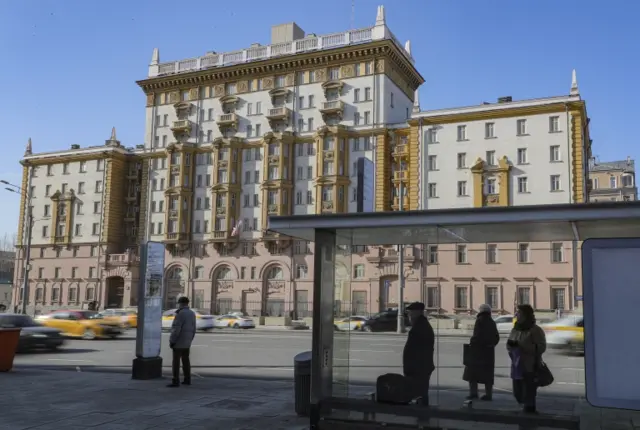 Image source, EPA
Image source, EPAThe US embassy in Moscow